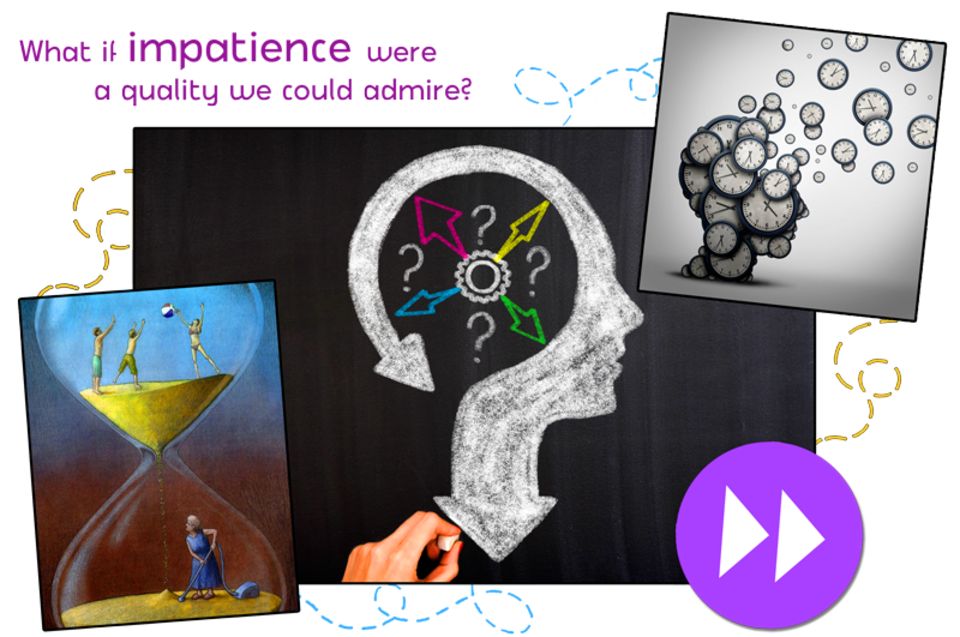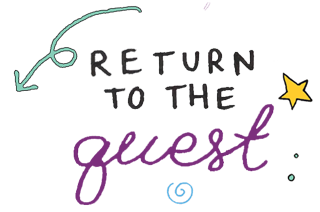
The virtue of impatience
| Objective: To envision a completely different universe in order to reveal the hidden dimensions of the concept of impatience! |
Duration: 30 to 90 minutes
Material:
- Sheets of paper and pens
- Coloured pencils and markers
Instructions:
Thought experiment: Imagine a world where... impatience was considered to be the best quality ever! What would this world look like? Would it be fantastic or horrible? How would this world be different from ours? How would life change? Would you want to live in this world of mental invasion? Why or why not?
...
- Think about the effects. As you imagine this world, you may start off feeling confused: how could being impatient possibly be viewed as a good thing? Doesn’t boredom often lead to impatience? To help clarify your viewpoint, think up a quick definition of impatience—for you, does it mean being easily irritated or itchily eager? Like you just can’t wait one more minute because you’ll tear out all your hair in frustration… or because you’re champing at the bit with enthusiasm to get going? Clearly, your positive or negative feelings about impatience will affect how you think about this alternate world! What might be some advantages of a universe where impatience is a virtue… and patience is seen as a sign of being lazy, unmotivated and sluggish? Make a list of three positive and three negative points about this celebration of impatience, and add reasons to explain your impressions.
- Variation: Consider how this world might affect life in different contexts, such as: relationships, school, jobs, government, art, religion, the environment, etc.
- Create a character. To take your thinking one step further, think about how this alternate world might affect the way different people in society are perceived. For example, how would we view a scientist in a mad rush to get a vaccine approved? What about a toddler throwing a tantrum? Or a dog desperate for his bone? What would happen if the most impatient people in this imaginary world—that is, those considered to be the best—were stuck in a waiting room, or in traffic, or on hold during a call… or in a burning house hoping for the firetruck to arrive? Who do you think would thrive most in a world where impatience is the best quality to have? Invent a character who is beautifully impatient, and envision how their daily expressions of impatience might be seen as upstanding and admirable by all those who know them. Describe their unique experience from their point of view, in as much detail as possible!
- Represent this world. Based on your reflections, imagine how you could represent your impressions of this alternative world—through a drawing, a collage, a diagram, a poem, or a dance. Your style can be realistic, abstract, comic, dramatic, etc. How could this world help us better understand—and even improve—our own?
...
Bonus: “Be patient!” Most of us have been told this little phrase more than once in our lives. But if we lived in this alternative world, the instruction would be the exact opposite: “Be impatient!” To have fun with this thought experiment, think back to three times that you were asked to be patient when the opposite reaction might have been much better. Maybe you wasted your time waiting around for a late friend… or you persisted with a school project that didn’t make any sense… or you stood by expecting an adult to punish a bully without delay. Now put yourself in the mind of the most impatient person in this imaginary universe, and imagine their thoughts: “Why should things take forever when they can be done in a flash?” “You’ve put up with that for far too long… what were you thinking?” “Why go the long haul when you can get instant gratification?” How might they have dealt with your situations differently? Once you have your ideas, think about your life more generally: What has helped you more—patience or impatience? |

Tricks for tots: To help you imagine this wacky world, why not try to intentionally feel some of the sillier effects of impatience? When you’re restless, do you ever want things to just hurry up? Well, imagine all of these things done in fast-forward mode! Pick a series of activities that you do regularly, and think about the sequence—how one step follows the other in a particular order. Now try to do that sequence… but at warped speed, as fast as you can! What does it feel like to impatiently brush your teeth, make your bed, do your favourite dance moves, read a comic strip, give a compliment to every member of your family? What are some tricks you can invent to do those things even quicker? Once you’re done, ask yourself whether hurrying up is a cure for impatience… or just a creator of more impatience! |
Tips for teens: Time flies when you’re having fun and slows to a halt when you’re bored… or so they say. But how can that be? Some scientists suggest it is hormonal—our brain releases more feel-good chemicals when we’re enjoying ourselves, and records our memory of that time experience accordingly. Plus, if we have a goal, we perceive time to be passing more quickly because we are so engrossed trying to attain it. But what if we could mess with our minds? According to the same research, the secret might be “flow”—or that sensation of getting lost in the moment. One way to get there may be to divide our emotional attention between the snail-like activity—what might feel boring or pointless but has to get done—and something more riveting… even if it’s just in our imagination. Test this out by doing one of your daily household chores while also engaging in one of these visualizations:
Afterwards, think about the experience: Did you succeed in making time fly by faster? Why or why not? And did you still get that boring chore done? |
Share your creative reflections by sending them via email.
Include photos of your projects and notes of your thoughts, as well as your first name and your age!


